- Home
- H. Rider Haggard
Allan and the Holy Flower
Allan and the Holy Flower Read online
ALLAN AND THE HOLY FLOWER
* * *
H. RIDER HAGGARD
*
Allan and the Holy Flower
First published in 1915
ISBN 978-1-62012-999-9
Duke Classics
© 2012 Duke Classics and its licensors. All rights reserved.
While every effort has been used to ensure the accuracy and reliability of the information contained in this edition, Duke Classics does not assume liability or responsibility for any errors or omissions in this book. Duke Classics does not accept responsibility for loss suffered as a result of reliance upon the accuracy or currency of information contained in this book.
Contents
*
Chapter I - Brother John
Chapter II - The Auction Room
Chapter III - Sir Alexander and Stephen
Chapter IV - Mavovo and Hans
Chapter V - Hassan
Chapter VI - The Slave Road
Chapter VII - The Rush of the Slaves
Chapter VIII - The Magic Mirror
Chapter IX - Bausi the King
Chapter X - The Sentence
Chapter XI - The Coming of Dogeetah
Chapter XII - Brother John's Story
Chapter XIII - Rica Town
Chapter XIV - The Kalubi's Oath
Chapter XV - The Motombo
Chapter XVI - The Gods
Chapter XVII - The Home of the Holy Flower
Chapter XVIII - Fate Stabs
Chapter XIX - The True Holy Flower
Chapter XX - The Battle of the Gate
Epilogue
Endnotes
Chapter I - Brother John
*
I do not suppose that anyone who knows the name of Allan Quatermain would be likely to associate it with flowers, and especially with orchids. Yet as it happens it was once my lot to take part in an orchid hunt of so remarkable a character that I think its details should not be lost. At least I will set them down, and if in the after days anyone cares to publish them, well—he is at liberty to do so.
It was in the year—oh! never mind the year, it was a long while ago when I was much younger, that I went on a hunting expedition to the north of the Limpopo River which borders the Transvaal. My companion was a gentleman of the name of Scroope, Charles Scroope. He had come out to Durban from England in search of sport. At least, that was one of his reasons. The other was a lady whom I will call Miss Margaret Manners, though that was not her name.
It seems that these two were engaged to be married, and really attached to each other. Unfortunately, however, they quarrelled violently about another gentlemen with whom Miss Manners danced four consecutive dances, including two that were promised to her fiance at a Hunt ball in Essex, where they all lived. Explanations, or rather argument, followed. Mr. Scroope said that he would not tolerate such conduct. Miss Manners replied that she would not be dictated to; she was her own mistress and meant to remain so. Mr. Scroope exclaimed that she might so far as he was concerned. She answered that she never wished to see his face again. He declared with emphasis that she never should and that he was going to Africa to shoot elephants.
What is more, he went, starting from his Essex home the next day without leaving any address. As it transpired afterwards, long afterwards, had he waited till the post came in he would have received a letter that might have changed his plans. But they were high-spirited young people, both of them, and played the fool after the fashion of those in love.
Well, Charles Scroope turned up in Durban, which was but a poor place then, and there we met in the bar of the Royal Hotel.
"If you want to kill big game," I heard some one say, who it was I really forget, "there's the man to show you how to do it—Hunter Quatermain; the best shot in Africa and one of the finest fellows, too."
I sat still, smoking my pipe and pretending to hear nothing. It is awkward to listen to oneself being praised, and I was always a shy man.
Then after a whispered colloquy Mr. Scroope was brought forward and introduced to me. I bowed as nicely as I could and ran my eye over him. He was a tall young man with dark eyes and a rather romantic aspect (that was due to his love affair), but I came to the conclusion that I liked the cut of his jib. When he spoke, that conclusion was affirmed. I always think there is a great deal in a voice; personally, I judge by it almost as much as by the face. This voice was particularly pleasant and sympathetic, though there was nothing very original or striking in the words by which it was, so to speak, introduced to me. These were:
"How do you do, sir. Will you have a split?"
I answered that I never drank spirits in the daytime, or at least not often, but that I should be pleased to take a small bottle of beer.
When the beer was consumed we walked up together to my little house on which is now called the Berea, the same in which, amongst others, I received my friends, Curtis and Good, in after days, and there we dined. Indeed, Charlie Scroope never left that house until we started on our shooting expedition.
Now I must cut all this story short, since it is only incidentally that it has to do with the tale I am going to tell. Mr. Scroope was a rich man and as he offered to pay all the expenses of the expedition while I was to take all the profit in the shape of ivory or anything else that might accrue, of course I did not decline his proposal.
Everything went well with us on that trip until its unfortunate end. We only killed two elephants, but of other game we found plenty. It was when we were near Delagoa Bay on our return that the accident happened.
We were out one evening trying to shoot something for our dinner, when between the trees I caught sight of a small buck. It vanished round a little promontory of rock which projected from the side of the kloof, walking quietly, not running in alarm. We followed after it. I was the first, and had just wriggled round these rocks and perceived the buck standing about ten paces away (it was a bush-bok), when I heard a rustle among the bushes on the top of the rock not a dozen feet above my head, and Charlie Scroope's voice calling:
"Look out, Quatermain! He's coming."
"Who's coming?" I answered in an irritated tone, for the noise had made the buck run away.
Then it occurred to me, all in an instant of course, that a man would not begin to shout like that for nothing; at any rate when his supper was concerned. So I glanced up above and behind me. To this moment I can remember exactly what I saw. There was the granite water-worn boulder, or rather several boulders, with ferns growing in their cracks of the maiden-hair tribe, most of them, but some had a silver sheen on the under side of their leaves. On one of these leaves, bending it down, sat a large beetle with red wings and a black body engaged in rubbing its antennae with its front paws. And above, just appearing over the top of the rock, was the head of an extremely fine leopard. As I write to seem to perceive its square jowl outlined against the arc of the quiet evening sky with the saliva dropping from its lips.
This was the last thing which I did perceive for a little while, since at that moment the leopard—we call them tigers in South Africa—dropped upon my back and knocked me flat as a pancake. I presume that it also had been stalking the buck and was angry at my appearance on the scene. Down I went, luckily for me, into a patch of mossy soil.
"All up!" I said to myself, for I felt the brute's weight upon my back pressing me down among the moss, and what was worse, its hot breath upon my neck as it dropped its jaws to bite me in the head. Then I heard the report of Scroope's rifle, followed by furious snarling from the leopard, which evidently had been hit. Also it seemed to think that I had caused its injuries, for it seized me by the shoulder. I felt its teeth slip along my skin, but happily they only fastene
d in the shooting coat of tough corduroy that I was wearing. It began to shake me, then let go to get a better grip. Now, remembering that Scroope only carried a light, single-barrelled rifle, and therefore could not fire again, I knew, or thought I knew, that my time had come. I was not exactly afraid, but the sense of some great, impending chance became very vivid. I remembered—not my whole life, but one or two odd little things connected with my infancy. For instance, I seemed to see myself seated on my mother's knee, playing with a little jointed gold-fish which she wore upon her watch-chain.
After this I muttered a word or two of supplication, and, I think, lost consciousness. If so, it can only have been for a few seconds. Then my mind returned to me and I saw a strange sight. The leopard and Scroope were fighting each other. The leopard, standing on one hind leg, for the other was broken, seemed to be boxing Scroope, whilst Scroope was driving his big hunting knife into the brute's carcase. They went down, Scroope undermost, the leopard tearing at him. I gave a wriggle and came out of that mossy bed—I recall the sucking sound my body made as it left the ooze.
Close by was my rifle, uninjured and at full cock as it had fallen from my hand. I seized it, and in another second had shot the leopard through the head just as it was about to seize Scroope's throat.
It fell stone dead on the top of him. One quiver, one contraction of the claws (in poor Scroope's leg) and all was over. There it lay as though it were asleep, and underneath was Scroope.
The difficulty was to get it off him, for the beast was very heavy, but I managed this at last with the help of a thorn bough I found which some elephant had torn from a tree. This I used as a lever. There beneath lay Scroope, literally covered with blood, though whether his own or the leopard's I could not tell. At first I thought that he was dead, but after I had poured some water over him from the little stream that trickled down the rock, he sat up and asked inconsequently:
"What am I now?"
"A hero," I answered. (I have always been proud of that repartee.)
Then, discouraging further conversation, I set to work to get him back to the camp, which fortunately was close at hand.
When we had proceeded a couple of hundred yards, he still making inconsequent remarks, his right arm round my neck and my left arm round his middle, suddenly he collapsed in a dead faint, and as his weight was more than I could carry, I had to leave him and fetch help.
In the end I got him to the tents by aid of the Kaffirs and a blanket, and there made an examination. He was scratched all over, but the only serious wounds were a bite through the muscles of the left upper arm and three deep cuts in the right thigh just where it joins the body, caused by a stroke of the leopard's claws. I gave him a dose of laudanum to send him to sleep and dressed these hurts as best I could. For three days he went on quite well. Indeed, the wounds had begun to heal healthily when suddenly some kind of fever took him, caused, I suppose, by the poison of the leopard's fangs or claws.
Oh! what a terrible week was that which followed! He became delirious, raving continually of all sorts of things, and especially of Miss Margaret Manners. I kept up his strength as well as was possible with soup made from the flesh of game, mixed with a little brandy which I had. But he grew weaker and weaker. Also the wounds in the thigh began to suppurate.
The Kaffirs whom we had with us were of little use in such a case, so that all the nursing fell on me. Luckily, beyond a shaking, the leopard had done me no hurt, and I was very strong in those days. Still the lack of rest told on me, since I dared not sleep for more than half an hour or so at a time. At length came a morning when I was quite worn out. There lay poor Scroope turning and muttering in the little tent, and there I sat by his side, wondering whether he would live to see another dawn, or if he did, for how long I should be able to tend him. I called to a Kaffir to bring me my coffee, and just was I was lifting the pannikin to my lips with a shaking hand, help came.
It arrived in a very strange shape. In front of our camp were two thorn trees, and from between these trees, the rays from the rising sun falling full on him, I saw a curious figure walking towards me in a slow, purposeful fashion. It was that of a man of uncertain age, for though the beard and long hair were white, the face was comparatively youthful, save for the wrinkles round the mouth, and the dark eyes were full of life and vigour. Tattered garments, surmounted by a torn kaross or skin rug, hung awkwardly upon his tall, thin frame. On his feet were veld-schoen of untanned hide, on his back a battered tin case was strapped, and in his bony, nervous hand he clasped a long staff made of the black and white wood the natives call unzimbiti, on the top of which was fixed a butterfly net. Behind him were some Kaffirs who carried cases on their heads.
I knew him at once, since we had met before, especially on a certain occasion in Zululand, when he calmly appeared out of the ranks of a hostile native impi. He was one of the strangest characters in all South Africa. Evidently a gentleman in the true sense of the word, none knew his history (although I know it now, and a strange story it is), except that he was an American by birth, for in this matter at times his speech betrayed him. Also he was a doctor by profession, and to judge from his extraordinary skill, one who must have seen much practice both in medicine and in surgery. For the rest he had means, though where they came from was a mystery, and for many years past had wandered about South and Eastern Africa, collecting butterflies and flowers.
By the natives, and I might add by white people also, he was universally supposed to be mad. This reputation, coupled with his medical skill, enabled him to travel wherever he would without the slightest fear of molestation, since the Kaffirs look upon the mad as inspired by God. Their name for him was "Dogeetah," a ludicrous corruption of the English word "doctor," whereas white folk called him indifferently "Brother John," "Uncle Jonathan," or "Saint John." The second appellation he got from his extraordinary likeness (when cleaned up and nicely dressed) to the figure by which the great American nation is typified in comic papers, as England is typified by John Bull. The first and third arose in the well-known goodness of his character and a taste he was supposed to possess for living on locusts and wild honey, or their local equivalents. Personally, however, he preferred to be addressed as "Brother John."
Oh! who can tell the relief with which I saw him; an angel from heaven could scarcely have been more welcome. As he came I poured out a second jorum of coffee, and remembering that he liked it sweet, put in plenty of sugar.
"How do you do, Brother John?" I said, proffering him the coffee.
"Greeting, Brother Allan," he answered—in those days he affected a kind of old Roman way of speaking, as I imagine it. Then he took the coffee, put his long finger into it to test the temperature and stir up the sugar, drank it off as though it were a dose of medicine, and handed back the tin to be refilled.
"Bug-hunting?" I queried.
He nodded. "That and flowers and observing human nature and the wonderful works of God. Wandering around generally."
"Where from last?" I asked.
"Those hills nearly twenty miles away. Left them at eight in the evening; walked all night."
"Why?" I said, looking at him.
"Because it seemed as though someone were calling me. To be plain, you, Allan."
"Oh! you heard about my being here and the trouble?"
"No, heard nothing. Meant to strike out for the coast this morning. Just as I was turning in, at 8.5 exactly, got your message and started. That's all."
"My message—" I began, then stopped, and asking to see his watch, compared it with mine. Oddly enough, they showed the same time to within two minutes.
"It is a strange thing," I said slowly, "but at 8.5 last night I did try to send a message for some help because I thought my mate was dying," and I jerked my thumb towards the tent. "Only it wasn't to you or any other man, Brother John. Understand?"
"Quite. Message was expressed on, that's all. Expressed and I guess registered as well."
I looked at Brother John and Br
other John looked at me, but at the time we made no further remark. The thing was too curious, that is, unless he lied. But nobody had ever known him to lie. He was a truthful person, painfully truthful at times. And yet there are people who do not believe in prayer.
"What is it?" he asked.
"Mauled by leopard. Wounds won't heal, and fever. I don't think he can last long."
"What do you know about it? Let me see him."
Well, he saw him and did wonderful things. That tin box of his was full of medicines and surgical instruments, which latter he boiled before he used them. Also he washed his hands till I thought the skin would come off them, using up more soap than I could spare. First he gave poor Charlie a dose of something that seemed to kill him; he said he had that drug from the Kaffirs. Then he opened up those wounds upon his thigh and cleaned them out and bandaged them with boiled herbs. Afterwards, when Scroope came to again, he gave him a drink that threw him into a sweat and took away the fever. The end of it was that in two days' time his patient sat up and asked for a square meal, and in a week we were able to begin to carry him to the coast.
"Guess that message of yours saved Brother Scroope's life," said old John, as he watched him start.
I made no answer. Here I may state, however, that through my own men I inquired a little as to Brother John's movements at the time of what he called the message. It seemed that he had arranged to march towards the coast on the next morning, but that about two hours after sunset suddenly he ordered them to pack up everything and follow him. This they did and to their intense disgust those Kaffirs were forced to trudge all night at the heels of Dogeetah, as they called him. Indeed, so weary did they become, that had they not been afraid of being left alone in an unknown country in the darkness, they said they would have thrown down their loads and refused to go any further.
That is as far as I was able to take the matter, which may be explained by telepathy, inspiration, instinct, or coincidence. It is one as to which the reader must form his own opinion.

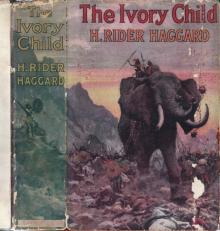 The Ivory Child
The Ivory Child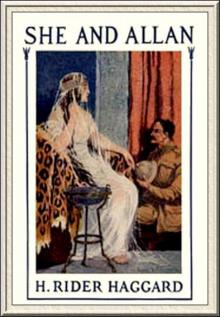 She and Allan
She and Allan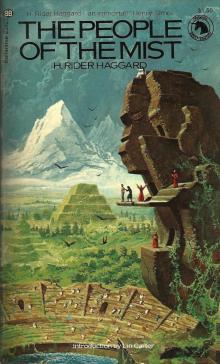 The People of the Mist
The People of the Mist She
She Morning Star
Morning Star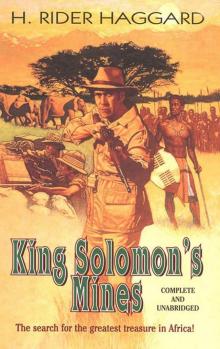 King Solomon's Mines
King Solomon's Mines She: A History of Adventure
She: A History of Adventure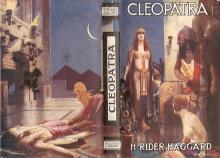 Cleopatra
Cleopatra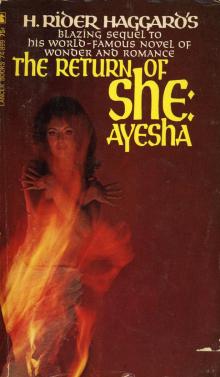 Ayesha, the Return of She
Ayesha, the Return of She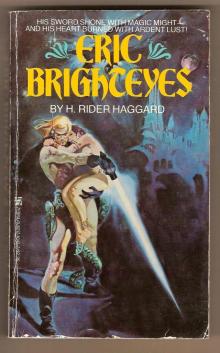 Eric Brighteyes
Eric Brighteyes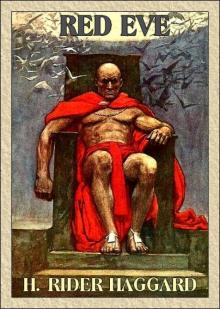 Red Eve
Red Eve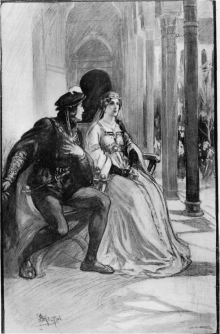 Fair Margaret
Fair Margaret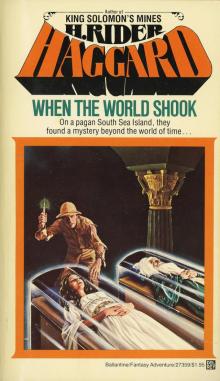 When the World Shook
When the World Shook Lysbeth, a Tale of the Dutch
Lysbeth, a Tale of the Dutch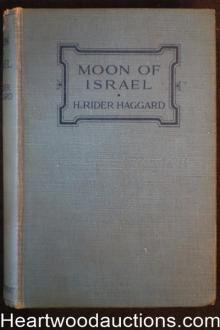 Moon of Israel: A Tale of the Exodus
Moon of Israel: A Tale of the Exodus Long Odds
Long Odds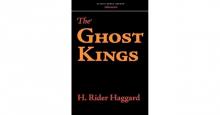 The Ghost Kings
The Ghost Kings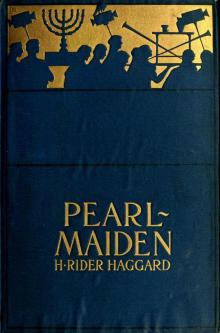 Pearl-Maiden: A Tale of the Fall of Jerusalem
Pearl-Maiden: A Tale of the Fall of Jerusalem Allan and the Holy Flower
Allan and the Holy Flower Smith and the Pharaohs, and other Tales
Smith and the Pharaohs, and other Tales The Wanderer's Necklace
The Wanderer's Necklace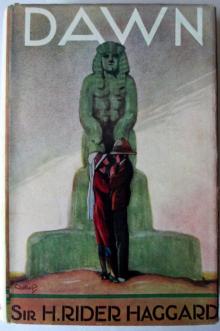 Dawn
Dawn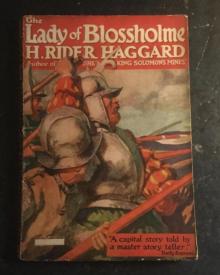 The Lady of Blossholme
The Lady of Blossholme Stella Fregelius: A Tale of Three Destinies
Stella Fregelius: A Tale of Three Destinies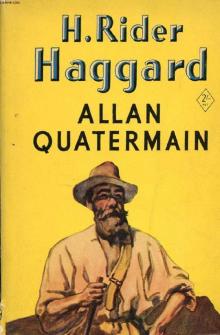 Allan Quatermain
Allan Quatermain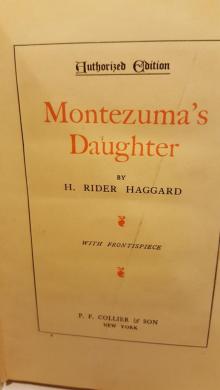 Montezuma's Daughter
Montezuma's Daughter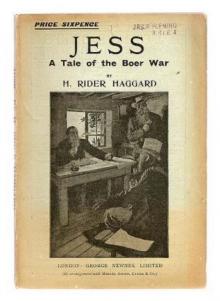 Jess
Jess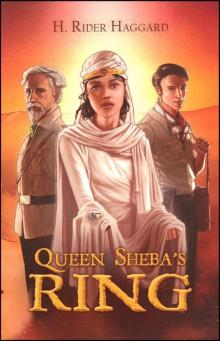 The Brethren
The Brethren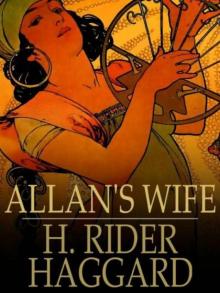 Allan's Wife
Allan's Wife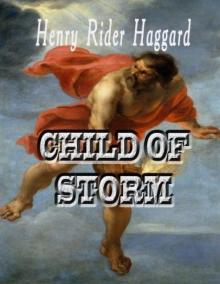 Child of Storm
Child of Storm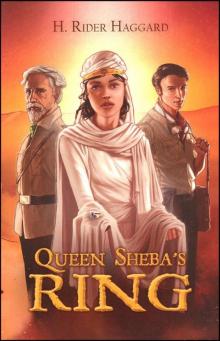 Queen Sheba's Ring
Queen Sheba's Ring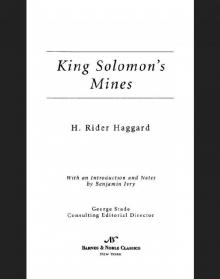 King Solomon's Mines (Barnes & Noble Classics Series)
King Solomon's Mines (Barnes & Noble Classics Series)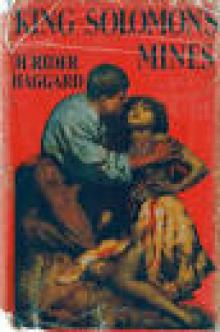 Complete Allan Quatermain Omnibus - Volumes 1 - 10
Complete Allan Quatermain Omnibus - Volumes 1 - 10